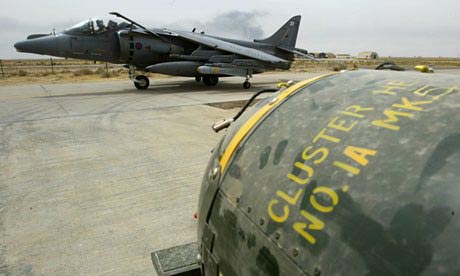
Local Editor
Saudi Arabia has confirmed that it used British-made cluster bombs in the Yemen war, increasing calls for the UK government to restrict arms sales to the kingdom.
The admission backs up the claims of critics, including Amnesty International, who have accused the Saudi-led coalition of "sheer recklessness" and misleading statements in its military campaign the Houthi Ansarullah revolutionaries.
Several thousand people have died in the Yemeni conflict, which began in 2011 but intensified after Saudi Arabia launched a military campaign in March 2015. The ten-country coalition, supported by the US, the UK and France, is fighting Houthi revolutionaries. Analysts have said that neither a military nor diplomatic resolution is near.
Saudi Arabia’s actions have been increasingly controversial in the UK, at a time when BAE Systemsis hoping to secure a £4bn sale of 48 Typhoon fight jets to the kingdom. Last week the US government vetoed some arms exports to Saudi Arabia, because of "flaws" in how the Houthi rebels were targeted.
Under the UN-backed Convention on Cluster Munitions, the UK is legally committed not to assist other countries using such arms.
Cluster bombs, which scatter smaller bomblets over a wide area, have been criticized for the threat they pose to civilians. Unexploded bomblets can kill or maim for months or even years after a conflict has ended.
Amnesty said in May that it had documented the use of six types of cluster bomb in Yemen - four of them US-made, one British and one Brazilian. It said the British-made BL-755 "contains 147 bomblets which scatter on impact with the ground but frequently don’t detonate until they’re later picked up, often by civilians unaware of their deadly nature".
As recently as last month, a spokesman for the Saudi-led coalition had said that evidence of the use of British-made cluster bombs was "manipulation", and that all stocks of such weapons had been destroyed.
Kate Allen, Amnesty International’s UK director, said that there should be "a total suspension of all weapons sales to Saudi Arabia that risk fuelling further atrocities in Yemen".
A suspension was backed in September by MPs on two parliamentary committees, including the chair of the arms export control committee. They said the reported use of cluster bombs "calls into question the coalition’s wider respect for the rules of war".
A third group of MPs, the foreign affairs select committee, disagreed, saying the matter should be decided next year by a court that is hearing a legal challenge from the Campaign Against the Arms Trade. A fourth committee, the defence select committee, declined to endorse either conclusion.
The British government has already been forced into an embarrassing correction over events in Yemen. The then foreign secretary Philip Hammond told parliament in February that Britain had "assessed that there has not been a breach of [international humanitarian law] by the coalition". But in July the government said instead that it was encouraging Saudi Arabia to conduct "their own investigations".
Source: The Financial Times, Edited by Website Team